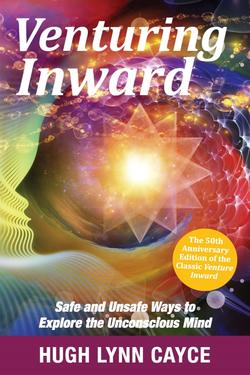Читать книгу Venturing Inward - Hugh Lynn Cayce - Страница 7
На сайте Литреса книга снята с продажи.
ОглавлениеForeword
PERHAPS MORE THAN ANYONE, HUGH LYNN CAYCE (1907–1982) was responsible for taking Edgar Cayce’s A.R.E.—the organization founded by his father, Edgar Cayce—from its humble beginnings and turning it into one of international renown. At the time of his father’s death in 1945, the organization had several hundred active members. Through Hugh Lynn’s efforts, lecture engagements, outreach to various professionals, publishing contacts, and his ability to inspire people wherever he went, he helped to build the A.R.E. into an organization of global outreach. Hugh Lynn spent a lifetime networking with professionals in a variety of disciplines. He paired Ph.D.s, comparative religious experts, parapsychologists, health care professionals, archaeologists, and others with information in the Cayce readings and invited exploration, research, and comparative study.
Because of his lifelong efforts, Hugh Lynn was instrumental in developing widespread recognition and acceptance of subjects such as psychical research, dream analysis, meditation, and personal spiritual development. Awarded the title of First Citizen of Virginia Beach in the 1960’s, he was known for his commitment and enthusiasm for working with young people. A dynamic and popular speaker, a champion of children, he spearheaded the creation of A.R.E. Camp and served for many years as a scoutmaster in Virginia Beach. His talents as a visionary, speaker, writer, and emissary of his father’s work left a lasting impact upon the Cayce legacy, as well as countless individuals who worked with Hugh Lynn directly.
When Venture Inward was published in 1964, it was described by The Christian Herald as “an invitation to the unexplored world of the unconscious … a sane and sensible guide to the powers and perils of psychic experiences … it is the number one book in its field.” Although there has been a great deal of information written about consciousness and psychic experiences in the intervening decades, there is still much more to learn about the unconscious mind. Ironically, the Cayce readings themselves stated as early as 1924 that the study of the unconscious, as well as the psychic forces and the soul, should be “the great study for the human family.” (3744–5) This book remains an extremely important resource, utilizing fascinating case histories that explore many dimensions of consciousness for anyone with questions or experiences in this area.
In addition to discussions of psychic experiences such as telepathy, clairvoyance, and mediumship, and altered states of consciousness such as drug-induced states, hypnotism, and meditation, this book is also a firsthand account of Edgar Cayce’s eldest son, Hugh Lynn Cayce, who knew his father better than any other individual and had the opportunity to directly work with the greatest psychic of the twentieth century for decades. Hugh Lynn spent his lifetime in the field of psychical research, researching and disseminating the information in his psychic readings, and helping countless others understand and work with their own psychic abilities. The story of Edgar Cayce is examined in this volume from an eyewitness perspective—the way no one else could tell it. The author also provides readers with safe, systematic, and proven approaches to exploring their own “venture inward,” exploring and clarifying the information in the Edgar Cayce readings on this subject. For those looking for “safer doorways to the unconscious,” they are described here and include meditation, dream interpretation, and personal spirituality as safe gateways to greater spiritual awareness.
Prompted by Hugh Lynn Cayce’s passion for the Work, Edgar Cayce’s A.R.E. (www.EdgarCayce.org) has grown from its humble beginnings to an association with Edgar Cayce Centers in countries around the world. Today, the Cayce organizations consist of hundreds of educational activities and outreach programs, children’s camps, a multi-million-dollar publishing company, membership benefits and services, volunteer contacts and programs worldwide, massage and health services, prison and prayer outreach programs, conferences and workshops, internet and online activities, and affiliated schools (Atlantic University: www.AtlanticUniv.edu and the Cayce/Reilly School of Massotherapy: www.CayceReilly.edu).
Throughout his life, Edgar Cayce claimed no special abilities, nor did he ever consider himself to be some kind of twentieth century prophet. The readings never offered a set of beliefs that had to be embraced, but instead focused on the fact that each person should test in his or her own life the principles presented. Though Cayce himself was a Christian and read the Bible from cover to cover every year of his life, his work was one that stressed the importance of comparative study among belief systems all over the world. The underlying principle of the readings is the oneness of all life, a tolerance for all people, and a compassion and understanding for every major religion in the world.
Today, the Cayce organizations continue the legacy begun by Edgar Cayce and forever inspired by Hugh Lynn Cayce with their undergirding mission to “help people change their lives for the better—physically, mentally, and spiritually—through the ideas in the Edgar Cayce material.” And, as Hugh Lynn was often heard to say, “How can we not share the best that we know?”
